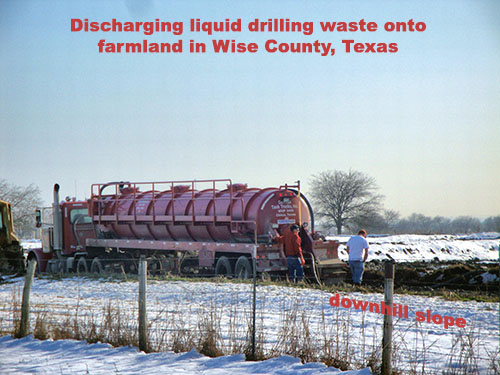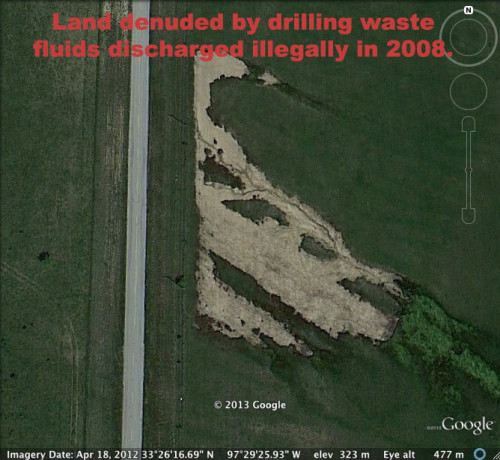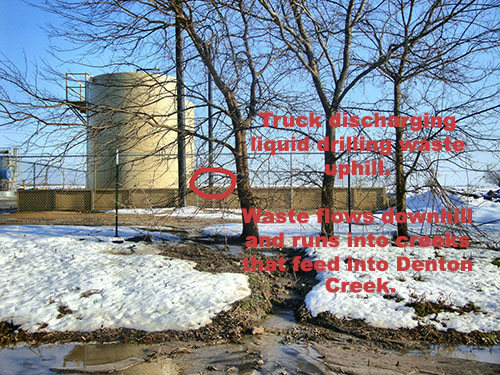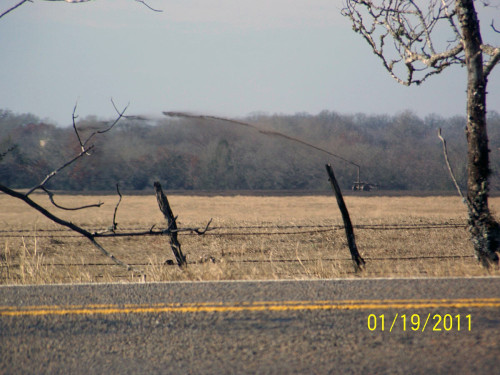
The news this week about livestock drinking drilling waste has the “Internets” in an uproar but it’s an everyday event in Texas.
When drilling waste is dumped–legally or illegally–on our farmland, into our rivers and into our air, it’s common sense that it will end up in our food chain.
Dr. E. Murl Baily, Jr., senior veterinary toxicologist at Texas A&M University, wrote a letter of concern to the mayor of Westworth Village concluding that the compounds were problematic to animals and human health as they move up the food chain in milk and meat. Flowback: HOW THE TEXAS NATURAL GAS BOOM AFFECTS HEALTH AND SAFETY
Drilling waste is in our food and the food our food eats.
A Texas A&M paper about land application of drilling fluids, warns landowners about damages from the current shale boom:
disturbance caused by construction of drilling locations, oilfield roads, and installation of pipelines can result in reduced crop production, increased susceptibility of the damaged sites to erosion, and increases in noxious and poisonous plant densities.
The paper warns that the petroleum products contained in the drilling fluids can be toxic to plants, can reduce soil oxygen levels and deplete nutrients. Salts and boron in drilling fluids can also harm plants and soil. The heavy metals found in drilling fluids, arsenic, barium, chromium, copper, lead, nickel and zinc are harmful to plants and…
…can accumulate in plant tissue (without harm to the plant) to levels which are harmful or toxic to animals and/or humans.
The paper has many recommendations, one of which is thoroughly testing the drilling fluids before land application. Currently the industry does it’s own testing and asks landowner to “just trust us.” I recommend not applying drilling waste to land but, if you must, do baseline testing of soil, water and air and have a lawyer look over the contract.
Last year, NPR reported on the loophole that allows toxic drilling waste to be dumped on Indian Land. Loophole Lets Toxic Oil Water Flow Over Indian Land, by ELIZABETH SHOGREN, November 15, 2012.
The news this week that EPA allows livestock to consume drilling waste should not come as a shock to anyone who has been paying attention.
“Under the less than watchful eye of the EPA, fracking flowback is dumped into rivers, lakes and reservoirs,” stated PEER Executive Director Jeff Ruch, pointing out that in both the current and the new proposed permits the EPA ignores its own rules requiring that it list “the type and quantity of wastes, fluids or pollutants which are proposed to be or are being treated, stored, disposed of, injected, emitted or discharged.”
I guess the shock is learning that the EPA is ignoring it’s rules. Again.
If you want a strong EPA that enforces strong rules, then you have to stand behind them and stand up to the GOP’s oppression. We’ve heard the House Science Committee has yet another “Beat up the EPA and defend Range Resources” hearing grandstand session planned for the 24th of this month.
Otherwise, you can have a Texas black angus beef burger raised on drilling waste with a salad of arsenic arugula.
Industry knows the waste if their biggest issue. From the fracking psyops conference:
Fracking is a farce we need to take care of waste water and we need to report chemicals. Brad Miller – General Manager of Regulatory Affairs, Anadarko Petroleum
Discharging liquid waste in “Booger” Robertson County, Texas
Fracking shale for oil or gas creates massive amounts of toxic, radioactive waste. It has to go someplace.
Drilling waste fact sheet specific to Texas.
About Sharon Wilson
Sharon Wilson is considered a leading citizen expert on the impacts of shale oil and gas extraction. She is the go-to person whether it’s top EPA officials from D.C., national and international news networks, or residents facing the shock of eminent domain and the devastating environmental effects of natural gas development in their backyards.
- Web |
- More Posts(5121)




I will never forget the words of a Chesapeake spokesman at a signing party saying, “Farmers love drilling mud because it makes great fertilizer.”
Nice touch with that song, “Cheeseburger in Paradise.” Guess it’s true ~ “You are what you eat.”
Fish Creek Neighbor recently posted..XTO Energy ~ A Master of Disguise?
So much good information Sharon, thanks. It’s clear the waste is a huge problem and they don’t know what to do with it all, except hang the liability – and toxics – on the landowners.
Fish Creek Neighbor, we get the same toxic waste salesman pitch here too.
Here’s what they say:
“They also collect drilling fluids in vacuum trucks. The drilling fluid consists of calcium nitrate (fertilizer) which is spread onto the farmer’s land after completion. This creates a double benefit for the farmer. He has lease revenue and fertilized land when it is all said and done.”
http://www.ernstversusencana.ca/wp-content/uploads/2013/04/2006-09-18-Shallow-gas-exploration-begins-in-area-Drilling-Waste-reported-as-fertiizer.pdf
Here’s what they do:
“In April a vacuum truck hauling drill cuttings to spread on the field (a process called land spraying) carried crude oil with it, depositing that on the field as well.
‘ … All it really is, is taking in sand and some shale’s and stuff from the hole we drill out before you get to the target zone and spraying it on the field …'”
http://www.prrecordgazette.com/2011/07/19/baytex-submits-action-plan-to-ercb-following-accidental-land-spraying-with-crude-oil
Texas beef, Alberta beef … mmmmm mmmmm.
And $80,000 a year for testing? I think New Zealand has the right idea – protect the people and the food.
“Fonterra has decided it will no longer accept milk from farms that have used drilling waste to convert marginal land into dairy pasture. … ‘I feel we’re risking a 25 billion turnover business, and I think it’s hugely irresponsible … both for our product, but of course, also for the health of our people.’
… The company said the cost of specially testing the milk for petroleum contaminants is too high, about $80,000 per year, and the testing is more trouble than it’s worth.”
http://www.radionz.co.nz/national/programmes/morningreport/audio/2559145/fonterra-to-stop-taking-milk-from-some-farms
http://blog.shaleshockmedia.org/2013/06/19/frack-free-milk-from-new-zealand/
I like my CSA farm. It’s outside any shale areas.
That’s fortunate, most of ours are smack-dab in the middle of one play or another.
Companies are destroying some of our best farmland here and I’ve never seen so many power poles and power lines going in, I feel bad for the farmers who have to try to work around them.
Most of ours are also but I specifically sought one that was outside the shale.
Guess what happens to some of the waste from Gas Wells?
lat 32.535592° long -97.570161°
Nice job on that video.
I guess we really are what we eat. Ditto on the great video David!
Those yummy Texas T-Bones–makes you wonder what is in those steak??